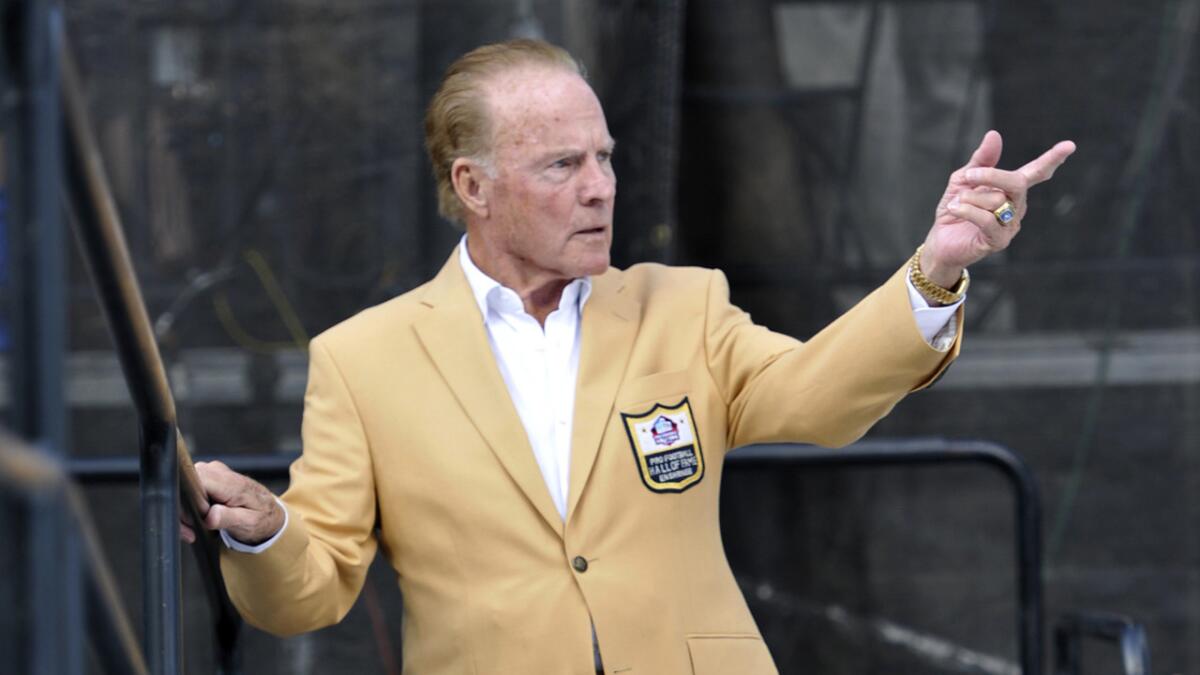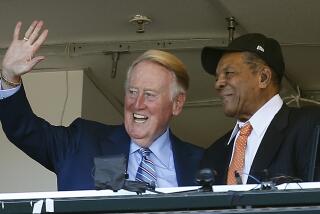Appreciation: Frank Gifford was admired in football for composure and sharp mind

Former NFL football player Frank Gifford during the induction ceremony at the Pro Football Hall of Fame in 2013.
- Share via
Always cool. Always composed. Always analytical.
That’s how Frank Gifford is remembered by Al Michaels, who worked with him in the “Monday Night Football” booth for 12 years.
“So many of us, especially in these high-pressure, high-profile businesses, there’s a tendency to have these knee-jerk responses to things,” Michaels said. “That was never Frank. Frank was always the guy who would assess it. He would do it quietly. Then he would very often have something on the back end, when everything had calmed down, that was well thought out.
“Frank never wasted any energy flying off the handle.”
Gifford died Sunday at his Connecticut home, a day after the annual Pro Football Hall of Fame induction ceremony in Canton, Ohio, an event he often attended. Before launching a successful broadcasting career, which included him working as a play-by-play announcer and color analyst for NFL games, Gifford was a Renaissance man for the New York Giants, playing on offense and defense.
The Giants’ first-round pick out of USC in 1952, Gifford spent part of his career playing offense and defense in the same game, even though it was increasingly rare in those days for players to do so. He was a multipurpose threat who could run, catch, field kicks and punts, and even play defensive back. He made it to eight Pro Bowl games, five NFL championship games, and was selected the league’s most valuable player in 1956.
A hit in 1960 caused a severe head injury that nearly ended his career. Gifford returned in 1962, switching from running back to receiver, and made the Pro Bowl before retiring in 1964.
With his square jaw and leading-man looks, Gifford was a striking figure on the Giants’ sideline in the decades that followed, a super-fan who seemed to defy age and belonged on the club’s Mt. Rushmore of greats.
“He was in amazing shape,” Giants co-owner Steve Tisch said. “I would shake his hand every Sunday when I would see him on the sidelines. He was so strong and in such great shape. He’d look you in the eyes with those blue eyes, and he just made me very proud to be part of the Giants family.”
Gifford was such a fixture on TV, and such a natural, a lot of people in younger generations weren’t aware that he played the game, and certainly not at the highest level. But the Giants players who came long after him knew.
“I remember him on the field before a game with his young sons at the time,” former Giants receiver and returner Phil McConkey said. “People just gravitated toward him, and he just had this kind of confident cool about him all the time without even trying. Just smooth.”
For McConkey, the memory of one conversation with Gifford stands out.
“It was about catching punts,” he said. “Obviously, he was a guy that understood. He appreciated the fact that my statistics weren’t great, because I would go catch a ball that other guys would let drop and roll back 15 yards. I would catch it and get one yard and get tackled, so it would show one return, one yard. It kills your average, but it saves your team 15 yards of field position. He complimented me, and I thought it was pretty cool coming from a legend like that.”
It was fitting that Gifford would appreciate that. Those were the types of calm, measured calculations he could appreciate, just like staying cool in the TV booth.
McConkey said there’s a special bond Giants players share, one that spans generations.
“Wellington [Mara] used to always say there are two kind of Giants, you’re either active or inactive,” said McConkey, referring to the team owner, who died in 2005. “There’s no such thing as ‘former’ or ‘ex.’ That sort of bred a brotherhood, and you feel connected.
“This loss, you feel it more because of that bond.”
ALSO:
Frank Gifford dies at 84; Pro Football Hall of Famer, TV sportscaster
More to Read
Go beyond the scoreboard
Get the latest on L.A.'s teams in the daily Sports Report newsletter.
You may occasionally receive promotional content from the Los Angeles Times.











